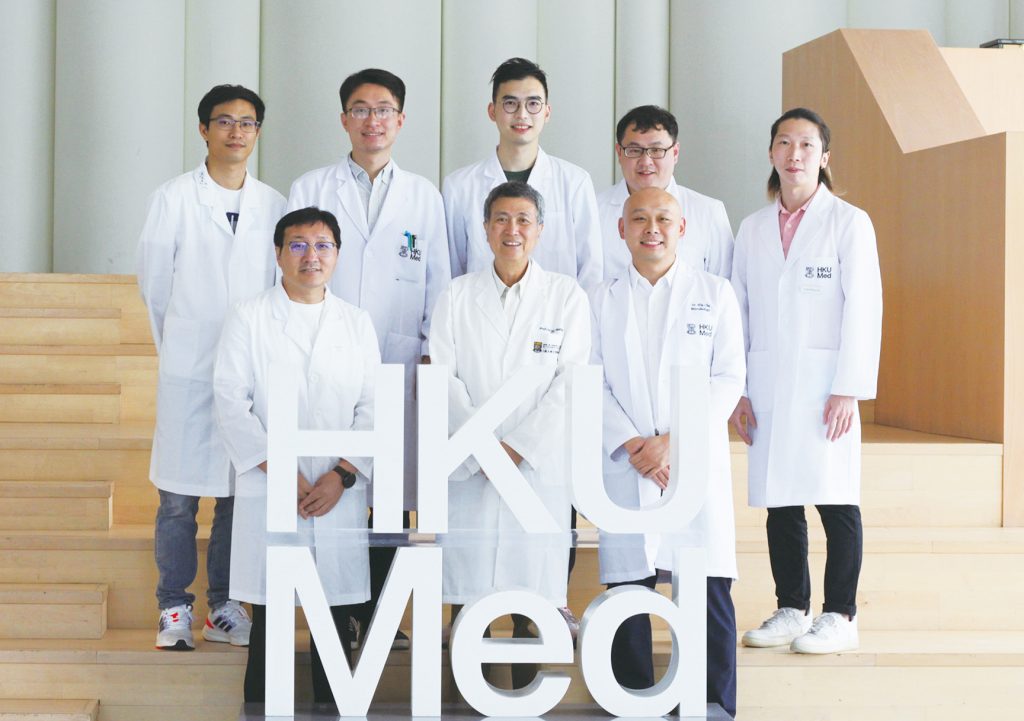May 2024 | Volume 25 No. 2
Taking the Strain
Listen to this article:
The discovery is the result of a collaboration between HKUMed and the Shenzhen Institute of Advanced Technology (SIAT), and originated from introducing the concept of ‘antigenic distance’ and ‘antigen field’ to select the optimal booster vaccine seed strain.
“The concept of ‘antigenic distance’ refers to the measurement of dissimilarity between different antigens, quantifying the variation in the strength of immune responses against these antigens,” explained Professor Huang Jiandong, L & T Charitable Foundation Professor in Biomedical Sciences and Chair Professor of Synthetic Biology at HKUMed, who led the study. “Based on this concept, we introduced the ‘antigen field’ to improve our understanding and quantification of interactions between the human immune system and foreign antigens.
“The ‘antigen field’ can be compared to an ‘electric field’, representing the fundamental interactions occurring within the immune space. When a specific antigen is encountered through infection or vaccination, it generates an ‘antigen field’, which – once activated – can ‘repel’ subsequent antigens attempting to enter the same field or those in close proximity based on ‘antigenic distance’.”
Using the ‘antigenic distance’ model, the researchers measured immune escape between different mutant strains, and from these results predicted the potential protection range of various strains as booster vaccines. A booster vaccine based on the SARS-CoV-1 strain, the original virus that caused the 2002–2004 SARS outbreak, appeared to offer broader and longer-lasting protection against COVID-19 variants.
“Vaccines developed and used from 2021 to 2022 were primarily based on the ancestral strain isolated in 2019,” said Professor Huang. “These vaccines aimed to elicit an immune response against the specific characteristics of the original strain. However, as new variants have emerged and spread, the effectiveness of vaccines based on the ancestral strain has been somewhat diminished.”
The term ‘ancestral strain’ refers to the original strain of SARS-CoV-2 that was first identified in December 2019. Also known as the original or wild-type strain, this strain has since evolved into various forms, including the Alpha, Delta, and Omicron variants.
In addition to the problem of new strains, other factors – such as immune escape, waning immunity, and immune imprinting – also make selecting booster vaccines for SARS-CoV-2 challenging.
Professor Huang said: “Immune escape occurs when the virus evades the protection offered by existing vaccinations. This happens when new variants, like the Delta and Omicron, emerge with genetic characteristics differing from the ancestral strain targeted by current vaccines. Consequently, vaccine effectiveness is compromised, necessitating the development and use of updated booster vaccines.”

The research team led by Professor Huang Jiandong (centre, first row).
Decline in protection
Waning immunity refers to the gradual decline in protection provided by natural infection or vaccination over time. While some vaccines, such as the smallpox vaccine, offer long-lasting immunity, the protection conferred by COVID-19 vaccines decreases after several months. This underscores the need for a long-lasting and broad-spectrum vaccine.
“The phenomenon of immune imprinting arises when the immune system depends on immunological memory from an initial viral or vaccine exposure, leading to a stronger immune response against the original virus or vaccine,” said Professor Huang. “However, this may compromise the immune response to slightly different versions of the virus encountered later. In the case of COVID-19, immune imprinting could hinder the effectiveness of vaccine development against emerging variants.
“Our study’s technique can overcome immune escape and immune imprinting challenges to some extent, while also addressing the issue of waning immunity.”
The breakthrough is important because, according to the World Health Organization (WHO), COVID-19 is likely to remain a part of our lives for the foreseeable future. “After the acute phase of the pandemic, it is expected to become a seasonal endemic, similar to the influenza virus,” said Professor Huang. “And, like the influenza virus, there is potential for new, more virulent variants to emerge, leading to future pandemics. Our team, along with international collaborators, will continue to monitor the emergence of new SARS-CoV-2 variants and work together with global experts to prepare for potential future pandemics.
“As the virus evolves, our methods of living with it will also adapt, which includes ongoing vaccination efforts and the development of effective specialised treatments.”
The ‘antigen field’ concept also has potential implications for developing vaccines and immunotherapies against other infectious diseases and even cancers. “This concept offers a framework for describing the range of protection and effectiveness of vaccines over time,” he said. “By optimising vaccine effectiveness and the duration of protection against current and future variants, the ‘antigen field’ concept can assist in designing ideal vaccines for other infectious diseases. Presently, we are applying the ‘antigen field’ theory to the development of an influenza vaccine and a vaccine against Staphylococcus aureus.
“Regarding possibilities for cancer treatments, while our theory primarily focusses on describing antibody-mediated immune responses, both the concepts of ‘antigenic distance’ and ‘antigen field’ can be extended to include T cell-mediated immune responses. Analogous to their application in infectious diseases, the ‘antigen field’ concept can be employed in developing cancer vaccines to prevent immune escape by cancer cells.”
As the virus evolves, our methods of living with it will also adapt, which includes ongoing vaccination efforts and the development of effective specialised treatments.

Professor Huang Jiandong

